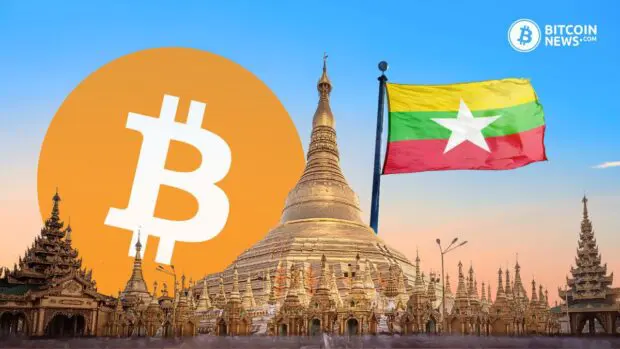Myanmar, a little-known country with a population of 50 million, embodies the array of challenges and aspirations faced by oppressed citizens living under a brutal dictatorship. Therefore the country, and Myanmar currency, present the Bitcoin world—which opposes tyranny and advocates for human rights—with a unique opportunity to demonstrate how Bitcoin can be a force for good in a turbulent world.
Myanmar’s Turbulent Past
On the unexpected morning of September 5th, 1978, Myanmar (also known as Burma) was stunned by Dictator Ne Win’s sudden declaration that the 75, 35, and 25 Kyats notes would no longer be legal tender, instantly rendering 80% of the currency in circulation obsolete.
This unforeseen announcement, which offered no chance for the conversion of these notes—unlike the 1985 demonetization—effectively wiped out the savings of millions of Burmese citizens overnight. The declassified CIA document referred to these actions as the “No Win Economic Policies.”
At that time, Myanmar lacked connectivity infrastructure, so the news spread by word of mouth. In short order, thousands of students in the country’s two largest cities, Rangoon (now Yangon) and Mandalay, marched in protest against Ne Win’s sudden demonetization policy. These protests were rapidly quashed by Myanmar’s brutal military regime, costing the lives of thousands of civilians. But due to Western sanctions and the junta’s isolation policy, this story quickly faded from the global consciousness.
The country of Myanmar—situated at the crossroads of India, China, and Thailand— is known for being a land of beauty and abundance. The country is dotted by thousands of ancient pagodas, virgin beaches, and untouched mountain landscapes.
Due largely to Myanmar’s abundant supply of natural resources, the country has been tortured by over 75 years of civil war, a series of bloody military coups, wide-scale human rights violations by the military (sometimes known as the “Tatmadaw”), and what is often described as the resource curse. In the early 20th century, Myanmar’s largest city Rangoon (now Yangon), rivaled New York City as the world’s largest immigration port and the “First America” for many families from the Indian subcontinent. This backdrop set the stage for the historical trajectory of modern Myanmar, which has been marked by multiple crises.
The Emergence of a Connectivity Revolution
Before 2010, obtaining a mobile SIM card in Myanmar cost $2,000, in a country where the GDP per capita was only $1,000 at the time. According to Bloomberg, Myanmar had fewer internet users than North Korea during the same period. With the internet symbolizing information freedom, the military junta propagated the idea that the internet was primarily a source to consume pornography. This was an effort to deter young people, who traditionally live under parents or older guardians, from spending time in internet cafes. It was slightly successful in the Buddhist conservative country.
In an era where information on the internet was heavily censored by the military junta, countless Myanmar users still remember the trepidation of sneaking out of their homes to reach their destination: the internet cafe. There, the Windows XP computer screen offered a gateway to the forbidden universe, and they utilized VPN programs to bypass restrictions.
Their cyber journey in the air-conditioned room, powered by an electric generator, was not merely for entertainment; it was a hunger for knowledge, a desire for connection with the outside world, an opportunity to practice their English, and a chance to read international news not available in physical papers. Some shared their wonderful discoveries on the internet with their peers in the classroom, who were not allowed to visit the internet cafe.
Advanced internet users at that time also found their place in the global tapestry. Some websites completely omitted the country’s name during the registration step, while others, scrolling through the options, hoped to see “Myanmar” listed among other nations. If not found, they would press “B” to search for “Burma”. These inconsistencies in recognition became a poignant symbol of the forgotten nation’s identity in the internet age. These minor inconveniences may seem small, but they were significant, forming collective memories for a generation and marking an early stage in claiming their identity and place in the 21st-century world.
A Tumultuous Transition
In 2010, Myanmar emerged from the shadows of isolation towards a path of democratic reform, culminating in the release of Aung San Suu Kyi after nearly 15 years of house arrest. Her freedom represented a hopeful shift towards democracy and human rights in the country. This period of transformation generated international attention and optimism. The evolution of Myanmar’s transformation was amplified by the historic visit of US President Barack Obama in 2012. As the first sitting US president to visit Myanmar was an impactful moment in relations and international recognition of Myanmar’s step towards reform.
The dawn of Myanmar’s transformation period crackled with vitality. As the country opened its doors, thousands of Myanmar from abroad felt the pull of their homeland, returning to fuel its development. Urban streets buzzed with open debate, while the rebirth of private daily newspapers breathed fresh air into public discourse.
Items once considered luxuries, such as M&M’s chocolate candies, found their way onto store shelves alongside Coca-Cola, marking their return after the U.S. lifted its sanctions, marking the end of over 60 years of absence from the market. Big Techs like Google, Microsoft, Visa, Mastercard, and global professional services firms like KPMG, Deloitte, EY, PwC, and numerous other global giants swiftly carved their niches in Asia’s frontier market.
To the outside eye, these might seem like just a regular market capturing in the capitalist machine, yet for those who had lived in isolation for decades, this influx was a tide of positive change that felt overwhelmingly significant.
While the world largely lauded Myanmar’s strides towards modernization, Myanmar’s journey towards a brighter future quickly ran into a huge speed bump. The advancement of connected technologies threw a stark light on the Tatmadaw’s ethnic cleansing of the Rohingya, a crisis fueled by Islamophobia and exacerbated by the spread of hate on Facebook and Meta’s Messenger platform, which had become the country’s default window to the internet and main communication channel.
Amid the turmoil, Jack Dorsey, then CEO of Twitter and a prominent Bitcoin advocate, chose Myanmar as the site for a 10-day silent vipassana meditation to celebrate his birthday. His silence on the military’s atrocities and human rights abuses drew sharp criticism. Jack tweeted, acknowledging:
“I’m aware of the human rights atrocities and suffering in Myanmar. I don’t view visiting, practicing, or talking with the people, as endorsement. I didn’t intend to diminish by not raising the issue, but could have acknowledged that I don’t know enough and need to learn more.”
A Perfect Storm Lays the Groundwork for Bitcoin
Myanmar’s hopeful transformation seems to be taking one step forward and two steps back. Despite connectivity technology and open-market developments, the 2021 Burmese military coup, resulted in imprisonment of President Win Myint, State Counsellor Aung San Suu Kyi, and many other elected civilian leaders, once again in 2021. The military junta wielded the centralized internet, centralized mobile services, and centralized financial institutions like a hammer, crushing the people’s uprising that wished for the taste of continued pushing forward the glimpsed freedom and progress.
Shortly after the coup, U.S. President Joe Biden moved decisively by freezing $1 billion in assets belonging to Myanmar’s government and unveiled a series of sanctions. At the end of his speech announcing these actions, President Biden’s said, “I’m sure I’ll see some of you at the Pentagon” fueling hopes of U.S. military intervention or support in the near future in the Myanmar community. However, such hopes were dashed as no military intervention or support occurred, leaving the Myanmar people feeling disheartened and without recourse.
During their massive crackdown after the coup, the Tatmadaw ordered telecom operators to stop mobile data internet services, a strategy to minimize information flow among protesters. Bank accounts were frozen en masse, targeting anyone who had donated to activism efforts or was actively involved in the resistance. During this chaos and violent suppression, the international media largely ignored the nightly arrests of activists in Yangon, and evidence that their dead bodies were returned to their families with clear signs of torture the next morning.
If there is any silver lining to Myanmar’s latest military coup, it’s that the coup has galvanized the entire country to fight against the junta and find creative ways to provide material and financial support for Myanmar’s Spring Revolution.
This is what makes Bitcoin such a powerful force for good and for the fight against totalitarianism. Alex Gladstein, Chief Strategy Officer of the Human Rights Foundation, underscored the potential of Bitcoin in this struggle in his book, Check Your Financial Privilege, which vividly recounts his personal experience during the early days of the revolution:
“As a personal example, someone reached out to me at the beginning of the Myanmar revolution in February 2021. They wanted to provide aid to the democracy movement, but the banking system was practically shuttered, and there was no easy way to wire dollars. After doing some digging, we were introduced to an aid worker-turned-activist, who was also a Bitcoin user. He could easily accept a donation, save it in BTC, and then sell it into the peer-to-peer markets when he needed to spend the collapsing local kyat currency on goods. An address was sent over Signal, and a gift was made in minutes. No barriers, no middlemen, and no possibility for corruption along the way. It is just one small example, but it is a glimpse of what the future could hold.”
Gladstein’s experience demonstrates that Bitcoin can play a critical role in grass-roots democratic revolutions—especially in places like Myanmar where inflation has run rampant.
Despite the Myanmar people’s resilience over three years, the weakness of Myanmar’s currency (the Kyat) fails to reflect their courage. The Kyat has plummeted by over 160% against the USD, with gold prices soaring by 190% in the same timeframe. Faced with such dire circumstances, many are forced to choose between fighting against injustice or ensuring their survival.
Given the junta’s threats of legal action against unauthorized foreign currency holders, gold remains the asset of choice for the vast majority, as real estate loans are underdeveloped and beyond the reach of average individuals living under the nation-state cage ruled by the oppressive military regime. Given this environment, Mekong Eye revealed that since the 2021 coup, at least 20 gold mining permits have been issued, some to companies linked to military personnel, in regions home to ethnic minorities in eastern Shan State.
This increase in gold mining exacerbates the hardships for local communities, particularly affecting women, girls, and students who grapple with the consequences of mud, floods, and polluted waters from mining activities. Some villagers lost entire houses and were forced to flee their places because their land was no longer fertile.
Not to mention the extreme environmental disaster caused by the military-linked gold mining companies. While Western mainstream media often criticizes Bitcoin technology and Bitcoin mining for its energy demand and environmental impact without bipartisan data, they ignore the glaring issues in its blind spot: the destructive nature of gold mining on the ground, a limited system of choice creating more and more wealth inequality, and exploitation of the minority group, especially in a country like Myanmar.
Myanmar’s Talent Pool Crushed by Western Sanctions
The shadow of military rule extends far beyond Myanmar’s remote areas, casting a pall over the entire country and extending to citizens living abroad. Western sanctions, though targeted at the military and its affiliated corporations and individuals, indiscriminately cause widespread hardship on both the freedom fighters and the general population. The military generals and their crony elite associates are supported by the other side of the international connections, getting out of the Western sanctions with relative ease. Simultaneously, the average Myanmar citizen finds themselves caught in an invisible fallout, where the sanctions act like radiation—extremely harmful but seemingly invisible.
For the country’s best and brightest, living under the boots of the military regime is unbearable, yet the pathways to a freer world are frustrating, and slim chances of getting a Visa. For example, in fiscal year 2022, the rejection rate for U.S. B-Visas for Myanmar nationals stood at 46.15%.
To offer a broader perspective on the issue, it is a figure that aligns with the rates for citizens from El Salvador, South Sudan, and Sierra Leone. Similarly, the F1 Student Visa rejection rate was 34.91%, indicating that even if a U.S. institution has accepted a student who deserves an American education and could potentially contribute to the U.S. economy in the future, does not guarantee visa approval. In the past year, 2023, only 1,877 Myanmar students successfully obtained their visas.
Passport privilege and financial privilege are two sides of the same coin. In an accelerated faltering economy, freelance websites have emerged as a vital lifeline offering a chance to earn harder currency and enhance professional skills for Myanmar people. However, platforms like Upwork, Turing, and Freelancer.com have recently withdrawn their services from Myanmar, citing Myanmar’s inclusion under the Office of Foreign Assets Control (OFAC) sanctions.
Similarly, TransferWise, a popular centralized money transfer service, announced, “Unfortunately, it’s getting increasingly difficult for us to operate in Myanmar, so we’ll need to suspend our service.” The decision by foreign companies to exit Myanmar structurally disempowers and isolates the country’s talented and ambitious citizens and only intensifies the challenges faced by Myanmar’s younger generation.
Myanmar Currency: Bitcoin as Vote to Hope
This frustration was vocalized by Htike, a Bangkok-based Myanmar citizen and digital production professional, who said, “It’s particularly tough for the young people” stated Htike. Htike then added:
“Most people rely on online payment methods for their online projects, but now we’re stuck because the online payment registration requires a Myanmar passport, and they are denying us their services simply for being Myanmar citizens.”
Through another voice message, Htike elaborated, “Rumors are circulating that many regional companies, whether in Singapore, Thailand, or Dubai, are hesitant to hire qualified Myanmar citizens due to these restrictions. It’s disheartening to see the burden fall on the shoulders of young, talented people who did not commit any crime.”
“To make matters worse,” he said, “Even LinkedIn refuses Myanmar passports for account verification purposes. It’s a sanction barrier, impacting not just professional opportunities but also our ability to connect globally.” He regularly commutes between Yangon and Bangkok for his business; he uses his Thailand bank account for international transactions, and he saves some of his savings in cyberspace. Under such extraordinarily challenging circumstances, who could deny that the magic of internet money is a lifesaver for them?
Like everywhere on earth, not everyone is equally adept at navigating the cyberspace. During a conversation with Myanmar’s parallel National Unity Government (NUG) Deputy Minister of Finance and Investment, Min Zayar Oo, addressed this gap.
Min Zayar Oo said, “In the early days following the coup, we fled to the jungle to avoid political persecution. It quickly became clear that there are no banks in the jungle. That’s where we realized the potential of Bitcoin and cryptocurrencies,” he shared, pausing thoughtfully before continuing. “While this technology offers potential solutions for our community living abroad, the reality on the ground is different. Many within our borders face a steep learning curve with this new technology.”
With Myanmar’s digital literacy level relatively low, the Deputy Minister’s observations are particularly relevant. Min Zayar Oo also highlighted another huge challenge:
“The most significant obstacle we face is the logistics of utilizing Bitcoin and cryptocurrency in areas like the Sagaing Region, where armed resistance is gaining ground.”
The question then becomes, ‘How do we convert digital currency to cash in areas where the internet is a dream?’ His insights underscore a serious hurdle in utilizing digital currencies as a tool for empowerment in a complex socio-political landscape.
“I keep my savings in Bitcoin and stablecoin,” declared Myat, a tech-savvy working class engineer residing in Yangon who has dreams of one day leaving Myanmar. “Just in case if we should need to flee for safety, there’s nothing we need to pack. We just leave.” Myat’s voice carried an unmistakable hopefulness about his potential departure, saying “It’s crucial for every Myanmar citizen to opt out of our current system and harness the maximum benefits from the alternatives.”










